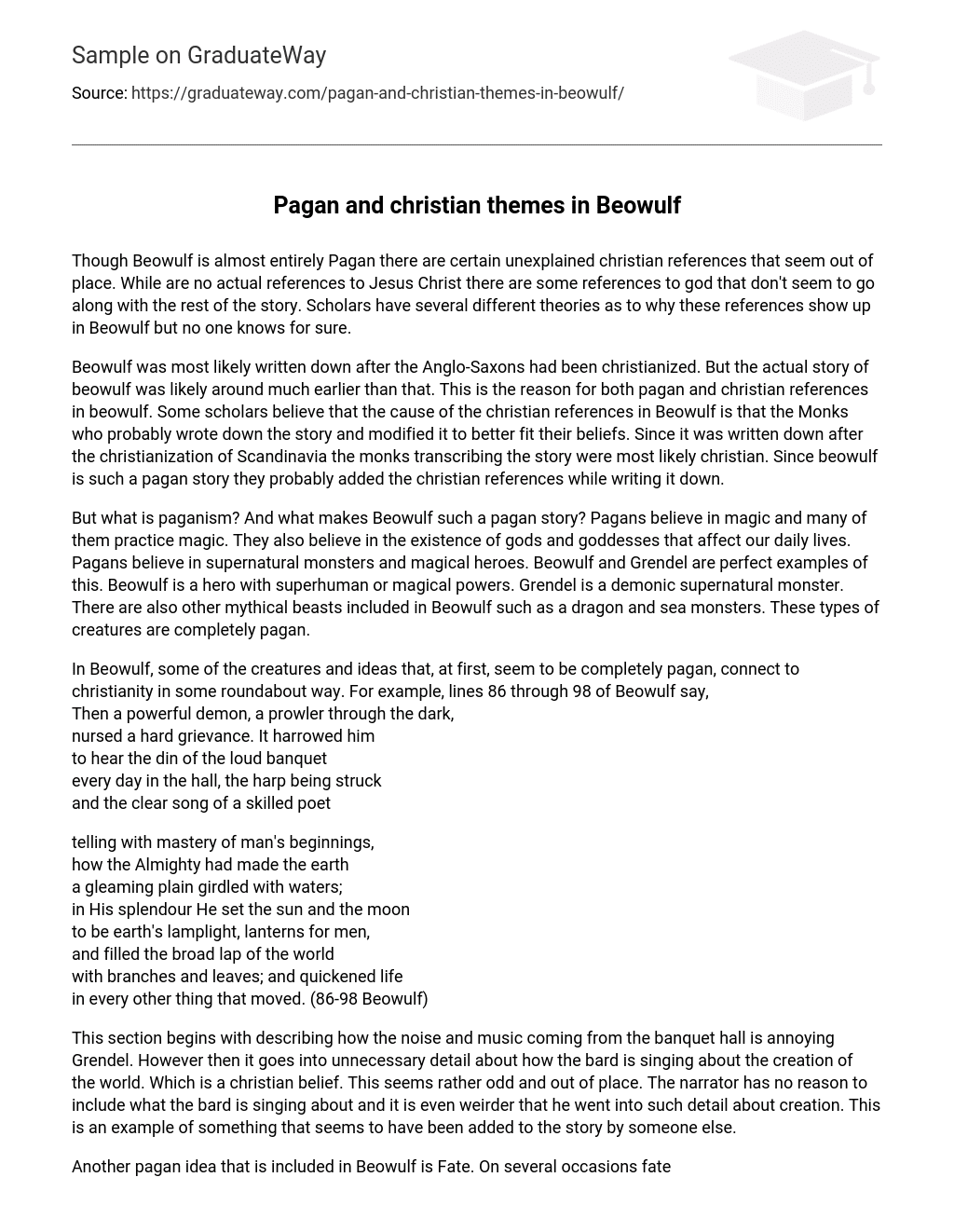Though Beowulf is almost entirely Pagan there are certain unexplained christian references that seem out of place. While are no actual references to Jesus Christ there are some references to god that don’t seem to go along with the rest of the story. Scholars have several different theories as to why these references show up in Beowulf but no one knows for sure.
Beowulf was most likely written down after the Anglo-Saxons had been christianized. But the actual story of beowulf was likely around much earlier than that. This is the reason for both pagan and christian references in beowulf. Some scholars believe that the cause of the christian references in Beowulf is that the Monks who probably wrote down the story and modified it to better fit their beliefs. Since it was written down after the christianization of Scandinavia the monks transcribing the story were most likely christian. Since beowulf is such a pagan story they probably added the christian references while writing it down.
But what is paganism? And what makes Beowulf such a pagan story? Pagans believe in magic and many of them practice magic. They also believe in the existence of gods and goddesses that affect our daily lives. Pagans believe in supernatural monsters and magical heroes. Beowulf and Grendel are perfect examples of this. Beowulf is a hero with superhuman or magical powers. Grendel is a demonic supernatural monster. There are also other mythical beasts included in Beowulf such as a dragon and sea monsters. These types of creatures are completely pagan.
In Beowulf, some of the creatures and ideas that, at first, seem to be completely pagan, connect to christianity in some roundabout way. For example, lines 86 through 98 of Beowulf say, Then a powerful demon, a prowler through the dark nursed a hard grievance. It harrowed him to hear the din of the loud banquet every day in the hall, the harp being struck and the clear song of a skilled poet telling with mastery of man’s beginnings, how the Almighty had made the earth a gleaming plain girdled with waters; in His splendour He set the sun and the moon to be earth’s lamplight, lanterns for men, and filled the broad lap of the world with branches and leaves; and quickened life in every other thing that moved. (86-98 Beowulf)
This section begins with describing how the noise and music coming from the banquet hall is annoying Grendel. However then it goes into unnecessary detail about how the bard is singing about the creation of the world. Which is a christian belief. This seems rather odd and out of place. The narrator has no reason to include what the bard is singing about and it is even weirder that he went into such detail about creation. This is an example of something that seems to have been added to the story by someone else.
Another pagan idea that is included in Beowulf is Fate. On several occasions fate is mentioned by beowulf after completing some task or before he embarks on an adventure. Sometimes there is a reference to god or some higher power but it seems out of place. For example, It threw the hero Into deep anguish and darkened his mood: the wise man thought he must have thwarted ancient ordinance of the eternal Lord, broken His commandment. (Beowulf)
This section describes Beowulf thinking about how he must have upset god to have ended up the way he did. This doesn’t seem to make sense with the rest of the story. Throughout the story Beowulf talks about leaving behind his legacy and how great his life is. He spends a lot of time boasting about how great he is and doesn’t seem to have any regard for any kind of god or higher power. So the fact that he completely changes and decided to believe in god at this moment doesn’t seem to fit in with the rest of the story.
Another major pagan belief that is shown in Beowulf is vengeance. For example, after Beowulf kills Grendel Grendels mother attacks to avenge her son. Vengeance is also shown after Hrothgar’s adviser is killed. When Beowulf says “Sorrow not, wise warrior. It is better for a man to avenge his friend than much mourn.” he is talking to Hrothgar. When he says this he is telling Hrothgar to avenge his advisor rather than mourn him. However after Beowulf says this, Hrothgar “”sprang up and thanked the Almighty for the hero’s words”. This again shows the narrator tying a pagan idea to Christianity, even though vengeance is not a christian idea.
Beowulf is obviously a Pagan story. It was written down right after Christianity became popular, but it surely around for much longer than that. There are simply too many pagan ideas in the story for it to be christian, such as Fate, Vengeance, Superhuman heroes’, and mythical beasts. Any christian references that do appear in the story are random and out of place. Beowulf is a pagan story written by pagan people in a time when paganism ruled.





